
Thursday, 10 September 202008:00 | Conference Registration, Materials Pick-Up, Morning Coffee and Pastries | |
Session Title: Conference Session -- The Landscape of Flow Chemistry |
| | |
Session Chair: Professor Paul Watts, Conference Chairman and Professor, Nelson Mandela University |
| | 09:00 | 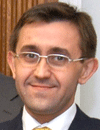 | Keynote Presentation Continuous Flow Manufacturing: Africa’s Possibility of Developing API Manufacturing
Paul Watts, Distinguished Professor and Research Chair, Nelson Mandela University, South Africa
While Africa has a variety of companies that formulate medicines it does not have any form of pharmaceutical industry that manufactures the active pharmaceutical ingredients (APIs) with the consequence that these need to be imported from overseas. This results in increased drug costs making medications unaffordable to most patients in Africa as they fall in the low-middle income bracket. To this effect, we are working on developing local drug manufacturing capacity in Africa using continuous flow technology, with the goal of lowering the cost of drugs, improving drug accessibility and ultimately improving Africa’s health. We are developing cost effective and efficient continuous flow synthetic processes towards a variety of drugs to demonstrate that they can be manufactured at lower cost in Africa. |
| 09:30 | 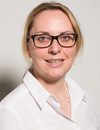 | Keynote Presentation Continuous Synthesis of Active Pharmaceutical Ingredients with In-House Designed 3D Printed Reactors
Heidrun Gruber-Wölfler, Associate Professor, Graz University of Technology, Austria
Continuous manufacturing has become increasingly attractive for the pharmaceutical industry, owing to the diverse benefits of continuous flow technology including fast heat and mass transfer, reduced waste generation, constant product quality and increased safety. Syntheses of active pharmaceutical ingredients (APIs) in a continuous process often involve new complex reactions, which are facilitated by the exploitation of Novel Process Windows concerning temperatures, pressures and concentrations. Consequently, tailor-made reactors are required to achieve optimal and controlled reaction conditions for selective product formation. An advantageous method for the quick and low-cost manufacturing of customized reactors is additive manufacturing, commonly known as 3D printing [5]. Taking up this approach, we designed and produced a number of different reactors utilizing active and passive mixing principles. Two production methods were used based on the needed chemical environments. Additive manufacturing of stainless steel via selective laser melting (SLM) was used for harsh conditions, while a UV-curable resin, processed via digital light processing (DLP), was used for milder reaction conditions. After characterization and assessment of their mixing performance, selected reactors were implemented into continuous setups for the formation of high-value products as well as API precursors. Besides the continuous aerobic oxidation of Grignard reagents to the corresponding phenols using different reactor types, a 3D printed split-and-recombine reactor was employed for achieving efficient mixing in a three-step cascade for the synthesis of a valsartan precursor in continuous flow. The final example deals with an enzymatic decarboxylation reaction in a multipurpose continuous stirred tank reactor, which led to the formation of resveratrol derivatives after a Pd-catalyzed Heck cross-coupling. In summary, in our work we demonstrate the high potential of 3D printing technology for the cost- and time-efficient production of custom-built reactors, applicable for the synthesis of relevant biologically active chemicals in continuous flow. |
| 10:00 | 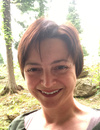 | Keynote Presentation Bridging the Gap Between Academia and Industry by Developing Robust and Scalable Biocatalytic Process in Continuous Production
Francesca Paradisi, Professor of Sustainable Pharmaceutical Chemistry, University of Bern, Switzerland
To increase the uptake of biocatalytic processes by industry, it is essential to demonstrate the reliability of enzyme-based methodologies directly applied to the production of high value products. Here the merging of flow technology with biocatalysis will be presented, showcasing the rapid evolution we achieved in our research group moving from analytical to preparative scale for the synthesis of valuable chemicals, while tackling a range of limitations such as substrate insolubility and cofactor recycling. |
| 10:30 | Morning Coffee Break and Networking in the Exhibit Hall | 11:15 | Development of Flow-based Syntheses of Pharmaceuticals
Darren Riley , Associate Professor, University of Pretoria , South Africa
The presentation will focus on the development of flow-based synthetic routes to several pharmaceuticals and will include aspects of batch-flow hybridization and reaction engineering. Insight will also be given pertaining to the use of flow technology as a disruptive leap-frogging technology for the localization of pharmaceutical manufacturing in developing countries like South Africa.
| 11:45 | Digital Flow Chemistry for Natural Product Synthesis
François-Xavier Felpin, Professor, University of Nantes, France
In this presentation we will present a reconfigurable flow platform for either reagent screening and self-optimization. | 12:15 | Multistep Synthesis of API Precursors in Continuous Flow Involving Heterogeneous Palladium Catalysis
Katharina Hiebler, Project Assistant / Researcher, TU Graz, Austria
Late-stage precursors of the two active pharmaceutical ingredients valsartan and sacubitril have successfully been synthesized in continuous flow using a multistep setup. The key step of the reaction cascades, Suzuki-Miyaura cross coupling, is facilitated by heterogeneous palladium catalysis. | 12:45 | Networking Lunch in the Exhibit Hall and Networking with Exhibitors and Poster Viewing | |
Session Title: Emerging Themes in Flow Chemistry and Convergence with Microfluidics |
| | |
Session Chair: Professor Darren Riley |
| | 14:00 |  | Keynote Presentation Microfluidic Approaches for Scale-up Chemical Production via Numbering-up & Ultrafast Chemistry
Dong Pyo Kim, Yonsan Chaired Professor, Pohang University of Science And Technology (POSTECH), Korea South
Continuous-flow technology is emerging for efficient, sustainable and safe synthesis of drug and the precursors. In here, scale-up chemical production are efficiently demonstrated by adopting both approaches of numbering-up microreactors and ultrafast chemical synthesis at high flow rates. Firstly, various numbering-up microreactor systems were designed and manufactured with stainless steel metal or polymer films. The compact and robust reactors demonstrated scale-up production of several drug compounds via azide-alkyne reaction, fast synthesis of organophosphates. Moreover, photocatalysis in a multi-capillary assembly system, 3D printed reactors were used to improve the synthetic productivity. Alternatively, ultrafast synthetic approaches were performed by taming the lithiated flash chemistry in unique microreactors at high flow rates, which envisions facile scale-up production of drugs. Unique design of a chip microreactor enabled submillisecond mixing time even at low temperatures, which was used for outpacing rapid intramolecular rearrangements such as anionic Fries rearrangement to attain high chemoselectivity. And 3D-printed stainless steel microreactor with circular shape of cross-sectional fluidic channel enhanced the intramolecular control for higher yield of the un-rearranged product. Further, a 16 stacked reactor system of circular channel structure with superior mixing efficiency was alternatively devised to synthesize commercial Letrozole drug by newly developed 3 steps route, including ~10 milliseconds of flash chemistry. |
| 14:30 | Interfacing Advanced Ion Mobility Spectrometry to Microfluidic Technologies
Maarten Honing, Professor, Maastricht University, M4I Institute Maastricht MultiModal Molecular Imaging, Netherlands
| 15:00 |  | Keynote Presentation Title to be Confirmed.
Amanda Evans, Scientist, Los Alamos National Laboratory, United States of America
|
| 15:30 | Afternoon Networking Coffee Break in the Exhibit Hall | 16:15 | 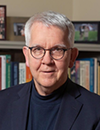 | Keynote Presentation Lab-on-a-Chip Studies of Bacterial Communities -- Spatiotemporal Characterization of Chemical Signaling and Virulence Agents
Paul Bohn, Arthur J. Schmitt Professor of Chemical and Biomolecular Engineering and Professor of Chemistry and Biochemistry, University of Notre Dame, United States of America
Despite the fact that most microorganisms occupy 2- and 3-dimensional space in heterogeneous ways and do not exist in monoculture, much of our current knowledge about the relation of bacteria to disease processes is derived from homogenizing, then analyzing, the chemical content of monocultures - an approach that yields no information about the 3D production and dispersal of secreted factors. To address this need, we are developing lab-on-a-chip (LOC) methods involving nanofluidics and spectroelectrochemistry to characterize the spatiotemporal evolution of secreted chemical factors used by bacteria to organize their community structures. LOC approaches are ideal for these studies, because they facilitate: (a) characterization of different mobility conditions, e.g. swarm, twitch, biofilm, etc.; (b) development and subsequent analysis of co-cultures of antagonistic bacterial species; (c) analysis of microbial communities in the presence of antibiotics; and (d) protein (mucin) templating of regulated surface communities. We have characterized the phenotypic responses and spatial variability of alkyl quinolones, including the Pseudomonas quinolone signal (PQS) and members of the alkyl hydroxyquinoline (AQNO) subclass, in P. aeruginosa swarming communities as well as the electrochemical and spectroscopic behavior of the phenazine class of virulence factors used by this species. |
| 16:45 | Micro-Flow Synthesis of Amino Acid N-Carboxy Anhydrides and Their Derivatization via pH Flash Switching and Rapid Dual Activation
Shinichiro Fuse, Professor, Nagoya University, Japan
Amino Acid N-Carboxy Anhydrides (NCAs) are important as monomers in polypeptide synthesis. The most conventional synthetic approach for NCAs uses strong acidic conditions. Therefore, NCAs containing acid-labile functional groups cannot be prepared. On the other hand, NCAs canbe rapidly generated under basic conditions, however, they rapidly occur overreactions under the basic conditions. We developed and used pH flash switching technology in a micro-flow reactor. Acid-labile NCAs were successfully prepared by our developed approach. We also demonstrated derivatization of labile NCAs using rapid dual activation of both NCAs and electrophiles in a micro-flow reactor. | 17:15 | 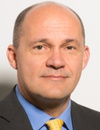 | Keynote Presentation Applications of Flow Photochemistry Towards Industrial Scale Processing
C. Oliver Kappe, Professor and Scientific Director, Center for Continuous Flow Synthesis and Processing, University of Graz, Austria
In recent years the popularization of synthetic photochemistry has brought with it a plethora of new methodologies, significantly enriching the chemist’s synthetic toolbox. Alongside classical UV-mediated photochemical methodologies, modern visible light methods (including photoredox transformations) are now being routinely included in synthetic routes at a small scale. These often offer unique disconnections, unachievable by alternative means, therefore, an efficient scale up strategy must be capable of including such transformations. As these molecules progress through stages of development, the process chemistry and manufacturing communities must be prepared, in terms of both equipment and expertise. Despite the inherent scalability implied by continuous flow processing, numerous obstacles are still present, including: reactor fouling, particularly when using UV irradiation; long reaction times, leading to low productivity; control of light flux over prolonged periods; and many more. With some extent of fundamental understanding around the reaction’s kinetic regime and irradiation requirements, the most suitable reactor and conditions can be chosen or developed. Accordingly, these obstacles can be overcome, or at least minimized, towards a robust and productive process. Herein, we present our experiences in developing a range of modern and classical photochemical transformations in continuous flow, in collaboration with industrial partners. These case studies will include: direct excitation and sensitized transformations, LED and arc lamp irradiation, tubing and plate-based reactors. The practical considerations, hurdles and solutions will be discussed, whilst maintaining a focus on application to processing on larger scales. |
| 17:45 | Networking Reception with Beer and Wine in the Rotterdam Pillars Bar -- Network and Engage with Colleagues in a Relaxed Atmosphere | 18:45 | Close of Day 1 of the Main Conference | 19:30 | Professor Paul Watts Training Course on Flow Chemistry [Separate Registration Required to Attend this Training Course] |
Friday, 11 September 202008:00 | Morning Coffee, Pastries and Networking in the Exhibit Hall | |
Session Title: Late-Breaking Session Chaired by Professor Paul Watts, Conference Chairman and Professor, Nelson Mandela University |
| | 09:00 |  Applications of Continuous Flow Chemistry Systems for Organic Synthesis Applications of Continuous Flow Chemistry Systems for Organic Synthesis
Manuel Nuño, Chief Scientific Officer, Vapourtec Ltd.
Terpenes are low cost, natural products which can be modified into more added value products when a ketone or hydroperoxide group is introduced. Here we report a green approach to perform such C-H functionalisations. Vapourtec has recently developed the Ion Electrochemical Reactor, which takes advantage of the extremely large surface-to-volume ratios that a flow microreactor provides to make selective electrochemical oxidation of terpenes. The applications of electrochemistry in flow will be discussed, showing also the examples of working with a divided cell design. Singlet oxygen is a powerful reagent in organic synthesis, and its generation in a continuous flow photochemical reactor is safer than in traditional batch routes. With the use of the newly developed 420 nm UV High Power LED, we report a high throughput ene like reactions of singlet oxygen with citronellol. The final part of the talk will focus on solid-phase peptide synthesis in flow. Although SPPS is a well-established technique, the lack of live inline data can lead to several problems, such as an incomplete peptide and waste of reagents. By recording the volume change in a variable bed flow reactor and, combined with an inline UV detector, Vapourtec’s team was able to evaluate difficult couplings and develop optimised conditions.
| 09:30 | Flow Technology for the Development of Synthetic Methodologies Based on Highly Reactive Intermediates
Renzo Luisi, Professor of Organic Chemistry, University of Bari, Italy
In the field of organic synthesis, the advent of flow chemistry and microreactor technology represented a tremendous novelty in the way of thinking and performing chemical reactions. These enabling technologies opened the doors to chemical transformations considered impossible if run under traditional batch processing. In this presentation, the impact of flow chemistry in the use of highly reactive organometallic reagents, and in particular organolithiums will be reported. Examples of isomerizations, carboxylations, and homologation reactions conducted under flow conditions will be discussed. | 10:00 | Title to be Confirmed.
Nick Thomson, Senior Director, Chemical Research and Development , Pfizer, Inc., United States of America
| 10:30 | Stereoselective Catalytic Reactions in (micro)Mesoreactors
Maurizio Benaglia, Full Professor of Organic Chemistry, Dipartimento di Chimica, Università degli Studi di Milano, Italy
(Organo)catalytic, stereoselective reactions involving nitro derivatives in batch and in (micro)-mesoreactors will be presented, and compared with stereoselective catalytic in-flow reactions in 3D-printed reactors. The fabrication of ad hoc designed reactors and other devices, to perform different reactions becomes now feasible and gives new impulse to the use of enabling technologies in the synthesis of complex molecules. The metal-free reduction of nitro compounds to amines mediated by trichlorosilane will be also discussed, comparing the in-batch procedure and the continuous flow process performed in mesoreactors. | 11:00 | Synthesis of Temperature-Responsive Soft Microgels of Any Shape Using Stop-Flow Lithography
Hanna Wolff, Research Assistant, Chemical Process Engineering, RWTH Aachen University, Germany
Stop-flow lithography is a microfluidic method for the fabrication of µm-sized particles with complex shapes. Such particles can be used as building blocks for tissue engineering or soft micro-robotics. Especially, soft and responsive materials are beneficial for these applications; yet, the fabrication of soft responsive particles with complex shape has been rarely reported. In the present work, the technique of stop-flow lithography is used to fabricate soft temperature-responsive microgels with a complex shape. This combination of microgel properties is achieved by using N isopropyl acrylamide (NIPAm) monomer along with crosslinker in the reaction solution. Within the investigations, the polymerization parameters and influences on crosslinking the NIPAm monomer are determined and show the necessity of a threshold amount of crosslinker to form stable microgels. Furthermore, by varying the crosslinker concentration, the stiffness of the microgels can be tailored from very soft to comparably stiff. Moreover, these soft microgels of complex shape show a responsive behavior to temperature making them an excellent building block for life-like responsive tissue engineering. | 11:30 |  | Keynote Presentation Title to be Confirmed.
Ian Baxendale, Professor, Durham University, United Kingdom
|
| 12:00 | Networking Lunch |
|

 Add to Calendar ▼2020-09-10 00:00:002020-09-11 00:00:00Europe/LondonMicrofluidics and Flow Chemistry Europe 2020Microfluidics and Flow Chemistry Europe 2020 in Rotterdam, The NetherlandsRotterdam, The NetherlandsSELECTBIOenquiries@selectbiosciences.com
Add to Calendar ▼2020-09-10 00:00:002020-09-11 00:00:00Europe/LondonMicrofluidics and Flow Chemistry Europe 2020Microfluidics and Flow Chemistry Europe 2020 in Rotterdam, The NetherlandsRotterdam, The NetherlandsSELECTBIOenquiries@selectbiosciences.com